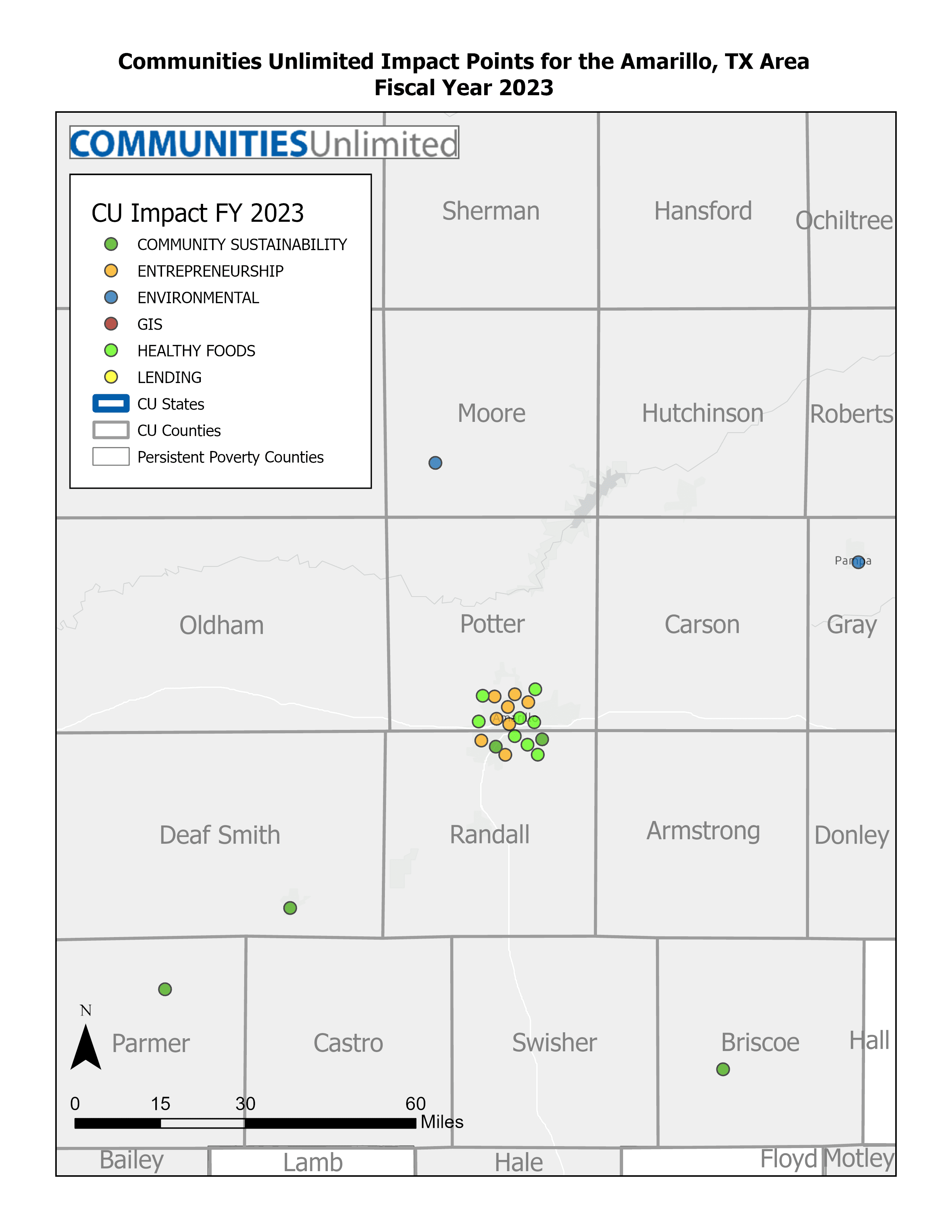In Amarillo and its surrounding West Texas communities, Communities Unlimited (CU) stands as a beacon of support and engagement.
With a presence spanning lending, community sustainability, community infrastructure, entrepreneurship, healthy foods, and broadband, CU has established itself as a vital ally in the region's progress. As a partner of the Amarillo Area Foundation, CU is deeply invested in the area's development and prosperity. Through collaborative efforts and innovative initiatives, CU continues to drive impactful change and foster growth across various sectors.
Here's a glimpse into some of those endeavors CU has assisted in the region over the past few years, currently, and in the future.
BLACK FIG FOOD
Personal chef services in Amarillo
Ruthie Landelius has seen remarkable success with her culinary venture, Black Fig Food, which took root in Amarillo back in 2015. With over 20 years of experience honing her culinary skills as a personal chef, catering specialist, and cooking instructor at a local community college, Landelius brings a wealth of expertise to her craft.

Her schedule reflects her dedication to providing top-notch culinary experiences. Landelius focuses on personalized chef services for families on Mondays and Tuesdays, while Wednesdays through Sundays are dedicated to larger catering events.
In February 2022, Black Fig Food turned to CU’s Lending Team for support, facilitated by a referral from PATH, an Amarillo-based community and economic development organization. With funds from the Amarillo Area Foundation, Landelius expanded her catering services, setting the stage for significant growth.
Guided by CU’s Entrepreneurship Team and Management Consultant Katy Parrish, Landelius received technical assistance, covering everything from startup planning to financial management and bookkeeping. The impact was evident as Black Fig Food flourished, doubling its revenue in 2023 and maintaining strong performance into 2024.
Expressing her gratitude, Landelius credited CU for providing the resources and equipment essential for her business’s success. Despite economic challenges, she remains optimistic.
“I wouldn’t have been able to do that without the help of Communities Unlimited,” Landelius said. “They gave me a chance to grow and get the equipment that I needed to do my job. It’s been great ever since. Maybe we’re in a recession, but I’m not feeling it. People got to eat. I’m turning work away. I’m fortunate.”
With her children now graduated and her household an empty nest, Landelius is poised to further expand Black Fig Food. She plans to increase her focus on personal chef services and diversify her income streams, catering to various client needs.
“The catering has increased a lot,” Landelius said. “I get a lot of work from the college. One of the local banks here uses me. These are all tax-exempt companies. It’s been growing. Now, the one thing I’ve noticed that is slowly coming in more and more is weddings. I provide meal prep service. I also offer cooking classes. Those are few and far between, but they are fun. I’m getting a lot of inquiries about dinner parties also, private dinner parties in the home of the client. I’ve got all those services that I offer and it’s been great. I love what I do.”
As she navigates her business’s growth, Landelius is collaborating with CU’s Lending Team once again to secure funding for extra equipment and a new kitchen space. Her vision includes hosting concept dinners to showcase her culinary creativity and provide immersive dining experiences.
Grateful for CU’s ongoing support, Landelius emphasized the organization’s vital role in empowering small business owners like herself. With their backing, she feels confident in her ability to realize her aspirations and continue building Black Fig Food into a culinary powerhouse in Amarillo.
“I’ve been fortunate to have y’all in my back pocket,” Landelius said. “It’s truly wonderful what Communities Unlimited has done for me and anytime I need more help, I always know I can call upon y’all. I need to get another loan. Y’all are more than willing to work with me. It’s nice to know that there’s somebody out there who is supporting the small business owner because it’s hard to build something from nothing and y’all understand that. You understand. You’re here to help us through all that.”
COCINA ON THE GO
Making moves with Mexican food on the go
Anna Lisa Ramos, the owner of Cocina On the Go, has navigated through various challenges and triumphs on her entrepreneurial path in Amarillo.
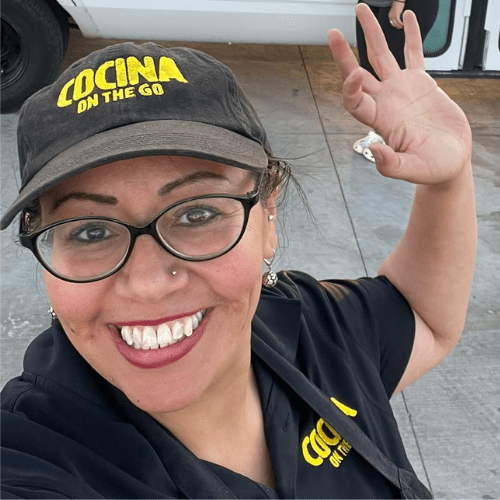
Ramos initially launched her food trailer venture with the support of a loan from CU back in August 2020. However, setbacks arose when the truck responsible for towing the trailer encountered mechanical problems and eventually failed. It was then that Ramos recognized the need for a strategic shift in her approach.
Ramos made a pivotal decision to swap her truck, opting instead for a taco truck in February 2023. With financial assistance from a family member, she procured a taco truck, better tailored to her requirements. Following significant investments in refurbishments and branding efforts, Ramos’ latest acquisition boasts a fresh coat of paint and proudly displays the official Cocina On the Go logo.
Moreover, Ramos’ business now benefits from the reliability of a sturdy vehicle.
“Now nothing is stopping me,” Ramos added.
Cocina On the Go is looking to reinvent itself once again, spurred by the burgeoning food truck industry in West Texas following the COVID-19 pandemic. Ramos highlighted the proliferation of over 200 food trucks in Amarillo as indicative of this growth.
“I’m not going to sit on the corner and hope I make a buck,” Ramos said. “I’m simply not going to compete.”
However, Ramos has shifted her focus towards expanding her catering services, honing in on a specialized market niche—post-memorial events. In addition to catering to corporate clients and special occasions, she aims to offer a distinctive and meaningful service.
“Post memorials is a market that hasn’t even been touched and it’s never-ending,” Ramos said. “That will get me covered for a few years. It’s going to be great. If I market that and specialize in that, we’ll be onto something.”
Then there’s also the advantage of having a taco truck, enabling Ramos to freshly make tacos at various events. Ramos hopes that catering and events will sustain her business through the slower months of January, February, and March, ensuring her continued success.
Previously, Ramos collaborated closely with CU’s Lending and Entrepreneurship Teams. Through their support, she secured an SBA loan and received technical assistance from the Entrepreneurship program.
Ramos, referred to CU by PATH, received expertise and training to launch her food truck business. CU provided guidance in bookkeeping and offered advice on refining her menu. While Ramos hasn’t sought further assistance from CU recently, she remains grateful for their initial support.
Over the years, Ramos has faced financial challenges, relying on loans to cover expenses, and hoping to improve her financial standing to qualify for additional funding. Despite setbacks like truck breakdowns, she remains determined to succeed, focusing on organizational tasks, and planning.
Ramos envisions expanding her business and eventually selling it, aiming for stability and growth with the support of organizations like CU.
“I want to have everything in order, so I have three potential food trucks running,” said Ramos, who also has a box truck in addition to the food truck and trailer. “This new truck is strong and sturdy. It’s going to get me new places. It’s going to get me to where I can get back, get ahead, and put money aside to fix the trailer and get the permit again for that trailer.
“Communities Unlimited will be the one again to help me grow and make moves. It’s good to know that there are organizations like that who believe in you. With my history, they’ll see everything going on and help me again.”
COPPER AXE COMPANY
Throwing Axes in Amarillo
Robyn and Rob Riggins made the move from Colorado to Amarillo in August 2021, laying the foundation for Copper Axe Company that October. In a relatively short time, Copper Axe Company has emerged as the go-to spot for axe-throwing adventures in the Texas Panhandle.

Copper Axe Company boasts five lanes, each featuring two targets for axe throwing. Perfect for date nights, family gatherings, and groups of all sizes, it offers an option for various occasions, such as birthday celebrations, anniversaries, corporate events, and bachelor or bachelorette parties.
The concept for launching the business originated during Robyn and Rob Riggins’ time in Colorado. Although they had friends who successfully established multiple axe-throwing ventures in the state, the Riggins realized they were ready for a change of scenery and didn’t plan to remain in Colorado.
The Riggins requested permission to adapt their acquaintances’ business plan, applying it to their new location in Amarillo to establish Copper Axe Company. Robyn Riggins shares the same enthusiasm for axe throwing as any other enthusiast. She finds it gratifying, especially experiencing instant gratification when hitting the target with precision and earning points.
“I teach people how to throw sharp objects at the wall,” Robyn Riggins quipped. “For people who are competitive, who don’t like to be outside, or who are not on a football team, this is a great way to get your frustrations out. Isn’t it everyone’s childhood dream to throw something sharp and get away with it?”
Listen to Robyn Riggins describe her initial experience working with CU
Last summer, Copper Axe Company underwent significant changes when their business partners opted to return to Colorado, leaving the Riggins facing financial challenges. Rob took on a full-time job, leaving Robyn solely responsible for managing the business operations.
With no prior experience in running a business, Robyn Riggins sought external guidance. She contacted Gina Woodward, the Regional Director for America’s Small Business Development Centers (SBDC) at West Texas A&M University (WTAMU), for assistance.
Woodward directed Riggins to CU’s Entrepreneurship Team and Parish. Their initial conversation took place over the phone, and they immediately established a strong connection.
“We talked for an hour and a half,” Riggins said. “It was fantastic. I love Katy to death. She got me plugged in.”
Collaborating with Senior Management Consultant Rhett Douglas and Parish, CU supported Riggins in understanding cash flow management. Riggins emphasized the assistance provided by Parish and Douglas, who guided her in understanding financial tracking through spreadsheets.
Not only that, Riggins learned how to manage various business aspects, which became crucial after their partners left, leaving behind a significant financial deficit. Before the engagement, Riggins felt overwhelmed.
“I felt like shark chum with sharks swimming around me where I had no idea where I was at,” Riggins said.
Despite the daunting situation, she expressed gratitude for CU’s support and guidance. With their assistance, Riggins gained confidence in managing the challenges and looked forward to collaborating in the future about marketing.
“Communities Unlimited walked with me through this whole situation,” Riggins said. “I now know how to do these things. They helped me see, ‘OK, this is how we can track it’ because it was me taking over the Titanic going into a sandbar.
“There are so many aspects of a business. Everybody would benefit from going through a class with Communities Unlimited just to be like, hey, these are the basics of what you need to know and why they’re important. Communities Unlimited saved my rear.”
HEALTHY COOKING DEMONSTRATIONS
Cooking Demonstrations Engage Community
The Community Sustainability and Healthy Foods Teams of CU have been engaged in cooking demonstrations in Amarillo. William Thrasher, a Community Facilitator, has played a pivotal role in this endeavor, which forms a key component of the Healthy Foods initiative and Cooking Matters program.
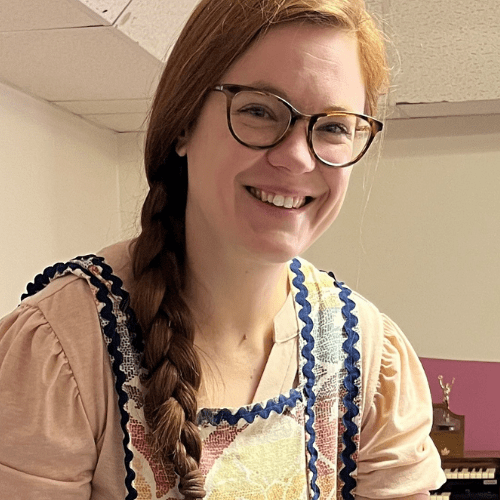
Thrasher has organized four demonstrations at the Heritage Center in the North Heights community, along with one at the Mariposa Senior Citizen Living Center and another at the Hilltop Senior Citizens Center. These sessions aim to show the public that ordinary food can be transformed into inventive dishes, adding a touch of excitement and creativity to culinary arts.
At the Hilltop Senior Citizens Center, Thrasher invited a representative from the county extension service to lead the demonstration. During the session, she showcased how to prepare a pumpkin stew and avocado pudding, resembling the texture and appearance of chocolate pudding.
“This pumpkin stew was anything but pumpkin,” Thrasher said. “The only reason we knew it was pumpkin stew is because she told us. It was off-the-chain delicious, as well as nutritious. She had chocolate pudding that was not a chocolate pudding, it was avocado pudding, but it tasted and looked like chocolate.”
Thrasher said the initial experience at Hilltop Senior Citizens Center, marked the beginning of their outreach efforts. The center had predominantly homeless people, but there was a strong interest in learning about nutritious meal preparation and the desire for better nutrition even in challenging circumstances.
“That was the most eye-opening and conscious jogging experience I think I’ve ever had,” Thrasher said.
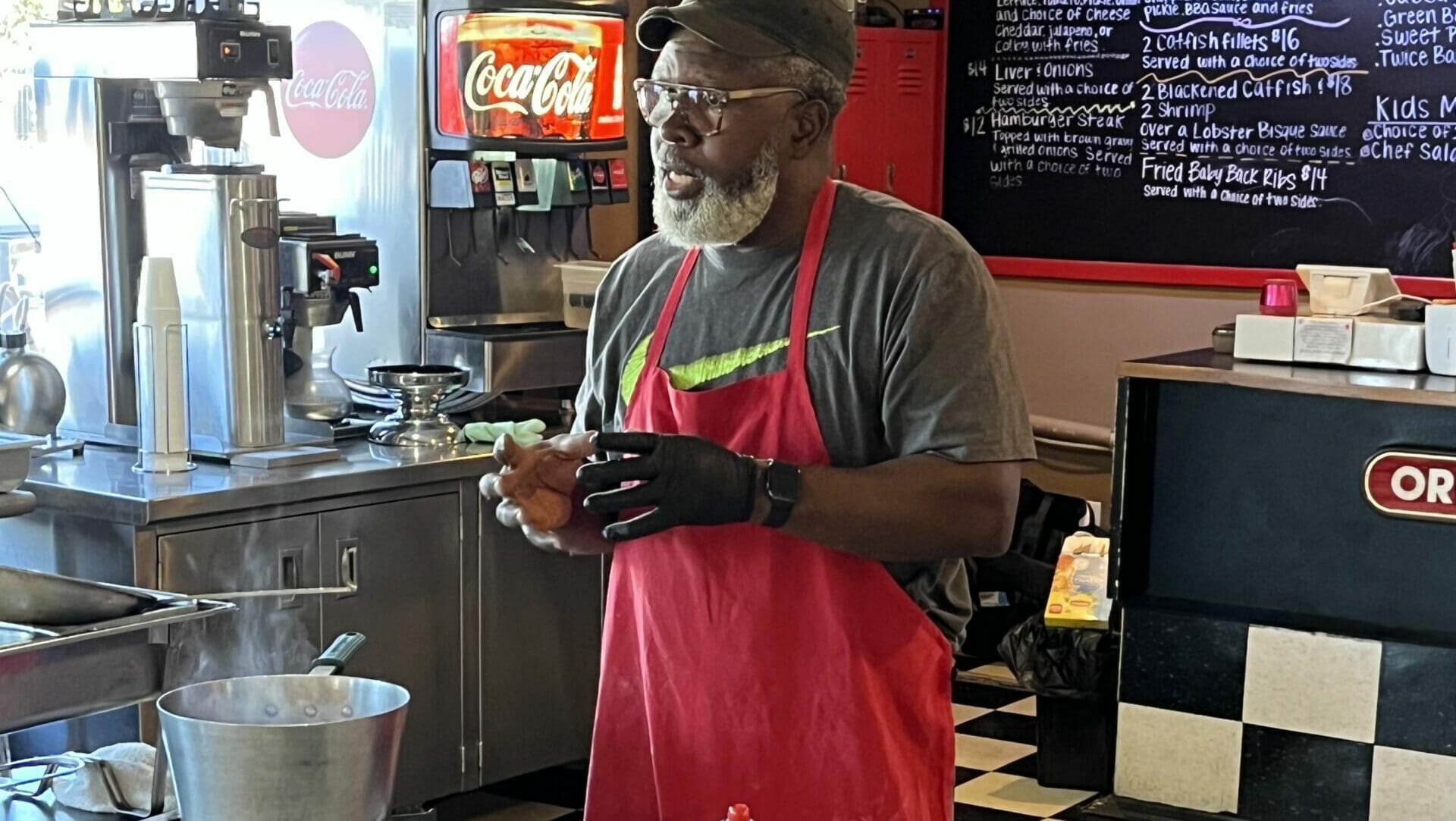
Warren Coble, Executive Director at Hilltop Senior Citizens Center, emphasized the value of simplicity highlighted in the project. He noted that the demonstration not only enhanced his understanding but also positively impacted his role at the center.
“I have stuff in my cabinet that I can now use differently nutritionally than what I knew of in the beginning,” Coble said. “When people can eat and it doesn’t break the bank and you have a delicious meal, I serve 100 meals a day, we have a nutritionist that puts that together for us. This is something your kids can do. This is something you could do for yourself and come out ahead.”
Thrasher said the overall goal of these demonstrations is to raise the public’s perception that food can be nutritious, as well as delicious. There are things they try to focus on with every healthy food demonstration. For another example, Thrasher said one of the local chefs conducted several demonstration projects, showcasing creative ways to incorporate watermelon, pineapples, cherries, and grapes into appealing and delicious dishes.
Thrasher said the demonstrations proved to be enjoyable and straightforward.
“Our job in Community Sustainability is to find the things that are working well in the community and build on those things while identifying areas of weakness that we can try to strengthen. The more we can strengthen the more sustainable the community will become. Healthy Foods are an easy way to get into the community and begin that process. Healthy Foods feeds the community, makes them healthier, and brings them together so that they can identify potential for themselves and strive to achieve greater things.”

— William Thrasher, Communities Unlimited
Coble offered praise to CU and Thrasher for their food demonstration.
“William engaged the seniors and the homeless people extremely well,” Coble said. “Anytime you can engage with people like Mr. Thrasher, he is all personality. You are always going to come out a winner. I believe I came out as a winner with the things he shared with me and helped me with my projects. We both came out a winner in the neighborhood.”
Additionally, the CS and Healthy Foods Team has assisted with the community garden in the North Heights community. This is another aspect of the Healthy Foods initiative. Before the garden was developed, Thrasher and the team conducted meetings with the organizations involved. Their role was to facilitate communication between the North Heights Advisory Association and North Heights Community Association to maximize assistance with the garden.
BROADBAND OUTREACH
Digital literacy for the whole community
Silverton ISD and CU’s Broadband Team make plans for a digital literacy program, not just for the school district, but for the whole community.
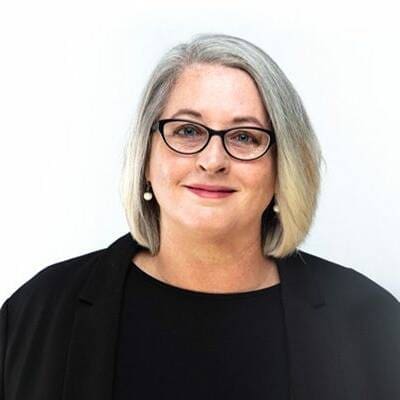
CU’s William Thrasher helps communities in Amarillo by figuring out what they need and connecting them with the right resources. Recently, the Silverton Independent School District, one-hour southeast of Amarillo, wanted to start digital literacy and adult computer classes. So, Thrasher started working on making it happen.
Thrasher linked Silverton ISD with CU’s Broadband Team because the request was computer-related. The Broadband Team saw a chance to help and started making a plan for a digital literacy program, not just for the school district, but for the whole community.
Ali Milligan and Shruti Machiraju, who serve as Digital Coordinators for CU under AmeriCorps American Connection Corps for a year, teamed up to create a detailed guide and plan. They’ll present these to the community and the school’s superintendent, Michelle Francis, in June, with help from Catherine Krantz, the Area Director of Broadband at Communities Unlimited.
Milligan described the guide as being divided into different parts, including sections on broadband resources, educational materials, digital literacy curriculum resources, and lists of organizations helping with digital skills development.
Machiraju explains everyone having access to technology and knowing how to use it well, so they can fully participate in society and the economy. Digital literacy, she adds, is a big part of this, covering the skills needed to use the internet and computers effectively.
“This digital literacy curriculum in Silverton is geared towards helping to promote digital literacy within the community,” Machiraju said.
CU’s Broadband Team will offer sample classes designed for different groups, such as adults or seniors. These sessions are open to everyone. Krantz says the goal is to help community members easily set up computer programs by providing the right resources.
“They know their community needs this, but they’re unsure how to proceed,” Krantz noted. “We aim to guide them, so they can confidently start offering these services without feeling overwhelmed. We want to make it easy for them to get started and make a positive impact.”
Francis praised the CU Broadband Team for their assistance in developing these materials. She says the information provided is both thorough and comprehensive, highlighting the amazing learning resources that will aid Silverton ISD going forward.
“I appreciate the team’s willingness to come to our community to help guide us in the process,” Francis said. “Their expertise will help us to make this program a success. The team has been very kind and patient with us through this process.”
Mark Pearson, the Interstate Coordinator on the Broadband Team, says there are already digital literacy programs in many areas. But now, with more federal money for expanding internet access, there’s a big push for projects promoting fair access to digital tools.
Pearson hopes that more school districts, like Silverton ISD, will join in this kind of effort.
“We’re building our toolkit,” Pearson noted of CU’s broadband work. “We’re not going to deliver training like this in all seven states, but doing that capacity-building is important for us.”
“The curriculum program built for Silverton is a spinoff of identifying other needs, other digital needs. The big picture of this is we're helping communities understand what they need. There are going to be grants coming out soon, and hopefully, we'll give them a leg up to go for some of that money.”

— Catherine Krantz, Area Director of Broadband, Communities Unlimited
LOMA ALTA WSC
Linking rural WSC to financial support for future
Community Infrastructure’s Kurt Grant assists water supply corporation with funding resources to ensure future regionalization projects

The Loma Alta Water Supply Corporation (WSC), close to Plainview, Texas, approximately an hour’s drive from Amarillo, has undertaken efforts to mitigate elevated nitrate levels in its water over the past few years. Gary House, serving as the water system’s manager for three years, has collaborated closely with project engineer Allen Phillips from Jacob and Martin to identify solutions aimed at addressing the nitrate issue.
They discovered that elevated nitrate levels in the water stemmed from a combination of natural and man-made sources affecting the local water table. According to regulations, Loma Alta WSC is permitted a nitrate level, known as the maximum contaminant level (MCL), of either 10 parts per billion or parts per million.
At times, the nitrate levels at Loma Alta WSC surpassed the permissible threshold, while on other occasions, they fell below it. However, consistently, they remained around the 10 parts per billion or parts per million marks. House documented this data on a chart to track the trend over time, engaging in discussions with Phillips about potential treatment approaches.
Initially, the focus was on water treatment, but the idea of regionalization soon emerged. Loma Alta WSC aimed to establish a connection with the City of Plainview. However, they later pivoted to linking with a neighboring WSC to blend water, thereby reducing nitrate levels.
“We had a source of water that is low nitrate and close to us,” House said. “This made sense, but it would cost a lot of money. Our system has 23 connections. It's a flat-charge water system. Our revenue is less than $2,000 per month. That doesn't build much capital to put in a $150-200,000 mixing station to alleviate this problem. Money was the problem.”.
In early 2023, Phillips was struck with inspiration: why not link Loma Alta WSC with the Community Infrastructure at CU? Recognizing the need for guidance on securing funding, Phillips suggested bringing in Kurt Grant, CU’s West Texas Regional Coordinator, with whom he had a successful prior collaboration. Grant’s proficiency in grant writing could prove vital.
Grant proposed that Loma Alta WSC explore financial assistance through the Texas Water Development Board (TWDB) grant. Their journey began when House, newly elected to the Plainview city council, participated in an orientation class at Spirit Ranch in Lubbock, organized by the TWDB and attended by stakeholders.
House explained the circumstances to TWDB executive Lee Huntoon, who recognized Loma Alta WSC as a fitting candidate for the grant program. Huntoon handed House a business card. This encounter coincided with Grant’s earlier advice to House and Phillips regarding pursuing this grant opportunity.
The grant application process unfolded in multiple stages, starting in March 2023 with the submission of a Project Information Form (PIF), a pivotal step to assess eligibility. House and Phillips collaborated with Grant and Pearson from CU on the PIF, which not only showcased Loma Alta’s utility size but also reflected the pressing necessity to address nitrate issues, catching the attention of the TWDB.

Following a week of anticipation, Loma Alta WSC received the green light from the TWDB to proceed with their application. As they progressed through the grant application process, they found themselves in a comprehensive interview session. With a dozen representatives from TWDB, the Texas Commission on Environmental Quality (TCEQ), and the U.S. Environmental Protection Agency (EPA) participating in the call, the pressure was officially on Loma Alta WSC.
“We answered questions with Kurt right there with us,” House said. “He had all the information that was needed. They were impressed by how well we prepared. That was all a credit to Kurt.”
Loma Alta WSC is now on the brink of securing the grant they’ve pursued. This grant, aimed at remedying nitrate issues and implementing household water meters to promote conservation, represents a significant milestone. In April 2024, their efforts were rewarded with administrative approval for $300,000 in funding.
The water system remains engaged in navigating the intricacies of the technical review process, refining drawings, and ensuring the execution of the grant proposal. This groundwork must ultimately gain approval from both the TWDB and TCEQ to secure the necessary funding.
House has firm anticipation that Loma Alta WSC will secure funding by late summer 2024, paving the way for construction soon thereafter.
Hear Gary House describe what it meant to have CU's Kurt Grant involved in his project
House emphasized that the true beneficiaries of this success story are the elderly women, both in their mid-80s, who are the owners of Loma Alta WSC. For years, they faced the daunting challenge of addressing the nitrate issues, with no clear solution in sight.
When House assumed his role three years ago, he recognized an opportunity to address this problem. This realization prompted the initial conversation with Phillips, followed shortly by engagement with Grant, setting the wheels in motion for the solution.
“It’s beautiful,” House said. “It’s storybook and the little ladies are overjoyed that we’re doing this and it’s not going to cost them at all. They’re both widows. They have fixed incomes on their investments or savings. They’re not going to have to dig into their savings and get a solution for this problem. We’re going to have it funded by an available source we didn’t know about before. It’s a Cinderella story, and I’m so happy about it.”
